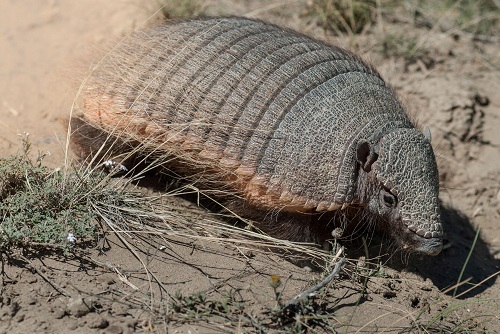Armadillos, known for their unique armored shells, are common in many parts of the United States, particularly in the southern and southeastern regions. These small, burrowing mammals can cause damage to lawns and gardens and are known carriers of leprosy, but are they a danger to dogs as well? In this article we will see in detail about Are Armadillos Dangerous to Dogs?
Are Armadillos Dangerous to Dogs?
Health Risks for Dogs
Armadillos are known carriers of leprosy, also known as Hansen’s disease. This bacterial infection can be transmitted to humans and animals through the armadillo’s saliva, urine, or feces. While the risk of transmission is low, dogs that come into contact with armadillos or their waste should be monitored for symptoms of leprosy, such as skin sores or muscle weakness.
In addition to leprosy, armadillos can also carry other diseases that can be transmitted to dogs, such as tuberculosis, salmonellosis, and ehrlichiosis. These diseases can cause serious health problems in dogs and should be taken seriously.
Behavioral Risks
Armadillos are generally shy and non-aggressive animals and typically avoid confrontation with dogs. However, if an armadillo feels threatened, it may use its sharp claws to defend itself. This can result in injuries to a dog’s face or paws.
Armadillos are also known to carry fleas, ticks, and other parasites that can be transmitted to dogs. These parasites can cause skin irritations, anemia, and other health problems.
Preventing Risks
To prevent your dog from coming into contact with armadillos, keeping your yard free of debris and overgrown vegetation is important, as armadillos prefer to live in these environments.
It is also important to keep your dog on a leash or in a fenced-in area when outside to prevent them from wandering into areas where armadillos may be present.
Will an armadillo attack a dog?
It is unlikely that an armadillo would attack a dog. Armadillos are generally shy and avoid confrontation with other animals. They are also relatively slow-moving and would likely try to escape if a dog confronts them. However, if an armadillo feels threatened, it may defend itself by rolling into a tight ball, making it difficult for a dog to harm it.
What are the risks of a dog eating an armadillo?
There are a few risks to a dog if it eats an armadillo. One risk is that the dog could contract leptospirosis, a bacterial infection found in the urine of infected animals such as armadillos. Leptospirosis can cause a wide range of symptoms in dogs, including fever, vomiting, diarrhea, and liver and kidney damage. Additionally, armadillos can carry other diseases like tuberculosis, so a dog that eats an armadillo would be at risk of contracting those.

Do armadillos carry rabies?
Armadillos can carry rabies, but it is relatively rare. Rabies is a viral infection primarily spread through infected animals’ saliva. Armadillos, like many other wild animals, can become infected with rabies if an infected animal bites them. However, the rate of armadillos testing positive for rabies is very low.
It is important to note that any wild animal can carry rabies, and it’s always best to avoid contact with wild animals, especially if they act unusually or aggressively. If you suspect your dog has come into contact with an armadillo or other wild animal, it is important to contact a veterinarian for guidance.
FAQs
Armadillos can carry diseases that can be transmitted to dogs, such as leprosy. They can also bite or scratch if they feel threatened. However, armadillos are not typically aggressive toward dogs and are more likely to flee if they encounter one.
Keep your dog on a leash or in a fenced-in area when outside to protect your dog from armadillos. Be sure to also keep an eye on them when they are outside and ensure that they are up-to-date on all their vaccinations, including ones for diseases that armadillos can carry.
If your dog has been bitten or scratched by an armadillo, it is important to seek medical attention immediately. Armadillos can carry diseases that can be transmitted to dogs, such as leprosy. Your vet can determine if your dog needs any treatment or testing and can advise you on any necessary steps to protect your dog’s health.
Final Verdict
Are Armadillos Dangerous to Dogs? To sum up, armadillos can pose a risk to dogs regarding health and behavior. However, you can minimize the risk by taking the proper precautions, such as keeping your yard clean and your dog contained and monitoring for symptoms. It’s important to consult a veterinarian if you suspect your dog has come into contact with an armadillo. By being aware and vigilant, you can help to keep your dog safe and healthy.
